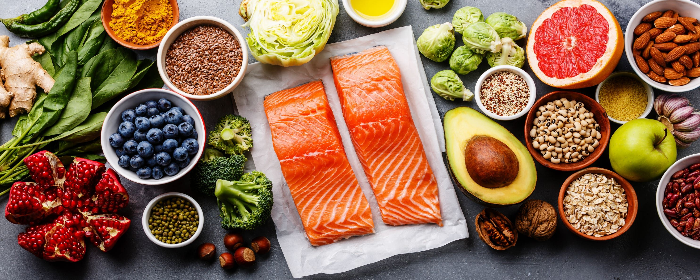
by admin | Jun 16, 2021 | Health Awareness
Your immune system is a complex network of organs and cells, including white blood cells, which protect the body against infection, disease, and other foreign invaders. To work optimally, the system requires specific nutrients—many of which you can get from food. Here are a few immune-boosting foods to consider adding to your diet for increased resistance against illness and infection.
Yogurt
Yogurt helps the body produce antibodies that attack viruses. This is likely due to its rich concentration of probiotics, which help the portion of the immune system found in the intestinal tract. For the healthiest options, choose plain, unsweetened yogurt to avoid the added sugar.
Garlic
Not only does garlic add lots of flavor to any dish, but it also has protective immune system benefits, thanks to the sulfur compounds in the vegetable. When chopped, it creates allicin, a compound with antiviral and antibacterial properties.
Nuts & Seeds
Nuts and seeds are good sources of vitamin E. This powerful antioxidant can help the body fight viruses. Moreover, options like Brazil nuts have more than a day’s serving of selenium, a mineral that can further support the immune system.
Leafy Greens & Citrus
We often think of citrus as the primary source of vitamin C, the antioxidant that helps to eliminate disease-causing free radicals. While oranges, lemons, and other citrus fruits are indeed fine options, leafy greens such as kale are also loaded with the vitamin.
Dark Chocolate
If you have a sweet tooth, feel free to give in to it now and then—specifically, with a piece of dark chocolate. The indulgent treat plenty of magnesium, which helps components in the immune system called lymphocytes bind to and fight invaders. If you prefer to skip the chocolate, avocados, brown rice, pumpkin seeds, and spinach are also rich sources of the nutrient.
Healthy Proteins
Proteins help repair muscle, but they’re also packed with zinc. This mineral is an essential source of fuel for white blood cells. In addition, it can help you maintain your energy levels and strength. Choose lean protein, such as low-fat cheese, chicken, or roast beef, for heart-healthy options.
Seafood
Seafood such as salmon, herring, mackerel, and sardines have omega-3 fatty acids that can help promote immune system function. Specifically, DHA, a type of omega-3, can promote white blood cell activity to strengthen immunity.
With so many immune-boosting foods to choose from, it’s simple to begin incorporating more of these foods into your diet every day. Most are also beneficial to overall health—not just your immune system—and are therefore excellent choices for filling your plate.
For more health awareness blogs, please visit www.stemedix.com/blog.

by admin | Jun 9, 2021 | Health Awareness
What we eat affects our health either positively or negatively. Researchers have found reasonable evidence to suggest that the Mediterranean Diet, which is rich in fats, fruits, and vegetables, can help lower the rate of type 2 diabetes.
A typical Mediterranean Diet is cooked with olive oil, lots of fish, and a limited number of processed meats. Studies have shown that such a diet prevents conditions such as abdominal obesity, high blood pressure, high cholesterol, and insulin resistance.
In a Women’s Health Study, 25,317 subjects were involved. The data involved in the research were collected at the time of enrolment. This data was from a food frequency questionnaire and blood samples of the subjects. The results showed that 2,307 subjects had type 2 diabetes. Those that showed to develop type 2 diabetes and followed the Mediterranean Diet developed the condition at a 30% lower rate than those who did not follow the same diet.
It is important to clarify that from this study, the data does not show that the Mediterranean Diet prevents diabetes but does suggest that it may delay or lower the risk of the condition. The study also shows that women with a higher BMI and who are on the Mediterranean Diet have a delayed response to diabetes than their peers of lower weight.
This study helps researchers to identify the factors behind the risk of developing type 2 diabetes. Furthermore, it gives specific parameters to measure which is of great help in prescribing solutions. Essentially, our diet can impact our overall health. It is important to make healthier choices to prevent conditions that may come because of poor or misguided diets.
In conclusion, the Mediterranean Diet may be one to consider as a daily regimen if you and your doctor feel it would be a benefit to you. It has a lot of various foods, is delicious, and is considered very healthy.

by admin | Jun 2, 2021 | Health Awareness
Stretching is often touted as an important part of a well-rounded exercise program. Yet, there’s a lot of misinformation that circulates about the practice. For instance, you may have heard:
- You won’t benefit unless you hold a stretch for a while.
- You shouldn’t bounce while stretching, or you could tear a muscle.
- If you fail to stretch before a workout, you’ll injure yourself.
These are actually myths, and in fact, you may wonder whether you really need to stretch at all.
Stretching: The True Story
According to the American College of Sports Medicine (ACSM), you should be stretching major muscle groups at least twice a week for 60 seconds per exercise. Stretching can help you stay flexible, supporting better mobility not only now but later in life, too.
For instance, if your back is stiff and sore from staying at your desk during the workday, a stretch such as a cat/cow (getting on all fours then slowly arching and curving your back upwards) can help to reverse some of the effects of staying seated for so long.
With that said, you don’t have to stretch for long periods of time just to get the benefits. Static stretches are meant to last 15 to 30 seconds, while dynamic stretches (in which you move through the stretches) are effective too—especially when completed as part of a warmup routine. Static stretching before a workout has not been shown to prevent injury, enhance performance, or reduce post-workout muscle soreness. Static stretches might even weaken performance because they can tire your muscles. On the other hand, dynamic stretches such as leg swings and walking lunges could help warm the body up before exercise.
Static stretches should therefore be reserved for post-workout. You’ll be more flexible since you’ve been moving your muscles and joints consistently. With that said, if you enjoy doing stretches other times throughout the day—besides when you normally do your workout—there’s no harm in working them in when it’s most convenient for you.
For more health awareness blogs, please visit www.stemedix.com/blog.

by admin | May 26, 2021 | Health Awareness
Superfoods are healthy meals that boost energy and protect the body from destructive pathogens and diseases. They are very nutritious, and when you take them moderately, you immunize the body and ensure its healthy growth. However, though these foods are essential for healthy growth, you must eat diverse and balanced meals, not only meals that are comprised of just superfoods.
A balanced diet is a meal that has all the classes of food in it. These classes of food are carbohydrates, protein, vitamins, fats and oil, and water. Your meal must comprise of these classes of food so that you can build a strong immune system and steer clear of diseases.
Vegetables and fruits should form a vital part of your daily meal. They have many antioxidants that benefit the body one way or another. In fact, most superfoods are vegetables, fruits, or a mixture of both. These superfoods include:
Avocados
Avocado pears are good for your heart, as they offer healthy poly and mono-saturated fat. A fruit that has magnesium, fiber, and fat, it regulates blood pressure and sugar and reduces the risk of heart disease.
Pomegranates
Pomegranate, a rarely known fruit, helps to bolster the health of the heart. It can also help to prevent cardiovascular diseases.
Berries
Every human’s brain functions for the majority of each day. And though it does need rest, it rarely gets it. Berries help to keep the brain healthy. It may also be a likely candidate to prevent Alzheimer’s disease. They have high fiber content, are low in calories, and have antioxidants that help to fight cancer-causing radicals. With berries, you can reduce your risk of contracting diabetes and other diseases.
Other superfoods include, but are not limited to, broccoli, chocolate, mushrooms, garlic, onions, nuts, sweet potatoes, and grains. No matter what you choose for your daily intake of superfoods, please be sure to ensure you have a well-balanced and healthy diet. Consult with your physician for guidance if needed.
If you are interested to know what your exact deficiencies and insufficiencies are, contact us for a comprehensive test that will give you a personal blueprint and help address root causes of symptoms you may be experiencing like fatigue, GI issues, anxiety, or sleep disturbances.

by admin | May 19, 2021 | Health Awareness
Cranberry juice isn’t the most common beverage choice, but many people enjoy it due to its health benefits. The U.S. is the world’s leading cranberry producer, with Wisconsin having produced more than four and a half million barrels of the tart fruit in 2019. The berry grows on vines and thrives in damp conditions.
One of the widest-held beliefs about cranberry juice is that it can help prevent or treat UTIs. This is due to the drink’s rich concentration of active ingredient A-type proanthocyanidins, which helps to prevent bacteria such as E. coli from sticking to the bladder wall. While it’s unclear whether the concentration of the active ingredient is high enough to treat or prevent UTIs, drinking the juice certainly won’t hurt.
As an added bonus, cranberry juice has many different vitamins and minerals, including:
- Copper
- Potassium
- Manganese
- Magnesium
- Calcium
- Folate
- Vitamin K
- Vitamin B6
- Vitamin B3
- Vitamin B2
- Vitamin B1
Cranberry juice is also loaded with vitamin C, a powerful antioxidant that can help minimize cell and DNA damage caused by free radicals. As a result, it could aid in the prevention of cancer, heart disease, and other conditions. Vitamin C also aids in the production of collagen, promotes healing, helps the body absorb iron, and supports the immune system.
Another standout antioxidant found in the juice is vitamin E, which is important to heart, skin, and blood vessel health. Additionally, anthocyanins in cranberry juice can help prevent the hardening of the arteries and prevent heart disease by promoting healthy blood pressure and cholesterol.
While the benefits of cranberry juice are clear, it should be enjoyed in moderation, and juice with added sugar is best avoided. Additionally, it could cause problems with blood thinners, so anyone on these medications should speak with their doctor.
For more health awareness blogs, please visit www.stemedix.com/blog.

by admin | May 12, 2021 | Health Awareness
Detoxing has gained plenty of attention in recent years. Based on the principle of reducing your exposure to toxins, this practice aims to promote general wellness, help optimize the immune system, and increase energy levels. There are many ways to detox, some of which include long stints of restrictive eating. Fortunately, the body detoxes itself quite effectively, to begin with. Organs such as the liver, digestive tract, kidneys, and skin eliminate toxins through waste such as sweat, stool, and urine.
With that being said, there are a few things you can do each day to help the body perform detoxification more efficiently. Here are a few options to try.
Minimize Use of Plastic
Plastic is notorious for chemicals such as bisphenol-A (BPA) and bisphenol-s (BPS). Thus, when you place drinks or food in plastic containers, it’s possible these chemicals can leach into them. Whenever possible, choose glass or stainless steel instead, and never heat food in plastic containers.
Wash Your Produce
While organic produce has lower concentrations of dangerous chemicals, any fruits and vegetables can contain trace amounts of pesticides. Over time, these harmful contaminants can build up in the body, potentially leading to health issues like nervous system damage. Reduce your exposure to these chemicals by washing all of your produce thoroughly. As an added bonus, it can help decrease your risk of exposure to foodborne illnesses.
Reduce Alcohol Consumption
Drinking alcohol stresses the liver, one of the body’s main organs responsible for detoxification. Abstaining altogether is one way to prevent the issue, but if you do choose to have a drink, limit it to one if you’re a woman or two if you’re a man. According to the CDC, this can help reduce the risk of long-term health issues, such as high blood pressure and certain types of cancer.
Up Your Fiber Intake
Fiber helps to keep your digestive system running smoothly by absorbing moisture and making waste easier to pass. It can also help you maintain a healthy weight, control cholesterol, and promote healthy blood sugar levels. Get plenty of fiber in your diet by incorporating foods such as beans, carrots, peas, oats, apples, cauliflower, and whole-wheat pasta or bread.
Hydrate Consistently
Like fiber, water aids in flushing the body of waste. It can help pass both urine and stool, promoting the body’s ability to flush toxins and any other unneeded substances. Be sure to drink when you’re thirsty and aim for eight cups of water each day.
Get Plenty of Sleep
Sleep promotes optimal health and can reduce stress on the immune system. Aim to get enough high-quality sleep by establishing a healthy bedtime routine. Stay away from electronics at least an hour before bed, maintain a cool and comfortable sleep environment, and limit caffeine consumption throughout the day.
Eat Detoxifying Foods
Several foods are known for their detoxifying properties. For instance, cruciferous vegetables contain glucoraphanin, which produces an agent that helps the body detoxify. Green tea is also loaded with agents that help the body detoxify, including natural polyphenols. Include these items in your diet regularly to boost your body’s natural detoxification abilities.
By incorporating small changes each day, you can reap the benefits of natural detoxification without the need for long fasts or extreme diets. Over time, these habits can help to power up your body’s detoxifying processes and promote long-term health.
For more health awareness blogs, please visit www.stemedix.com/blog







 St. Petersburg, Florida
St. Petersburg, Florida
